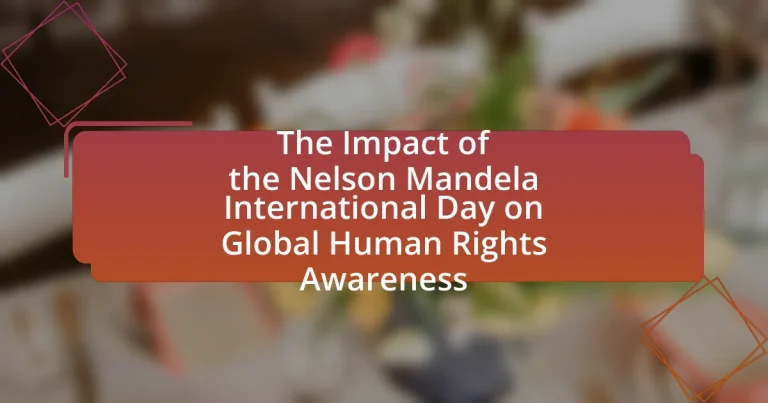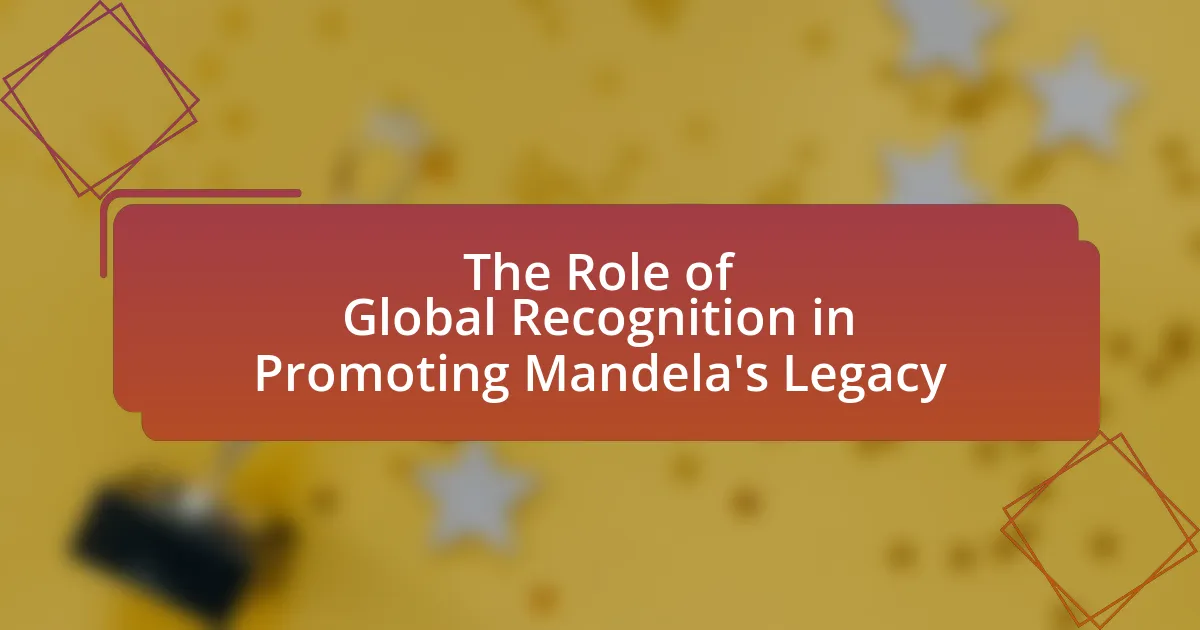The Nelson Mandela International Day, observed annually on July 18, honors the legacy of Nelson Mandela and promotes humanitarian efforts globally. Established by the United Nations in 2009, this day encourages community service and advocacy for social justice, reflecting Mandela’s commitment to human rights. The article explores the historical context of the day, its significance in human rights advocacy, and the various initiatives that have emerged to raise awareness and inspire action. It also highlights the measurable impacts of the observance on global human rights policies and the role of individuals and organizations in contributing to its goals.
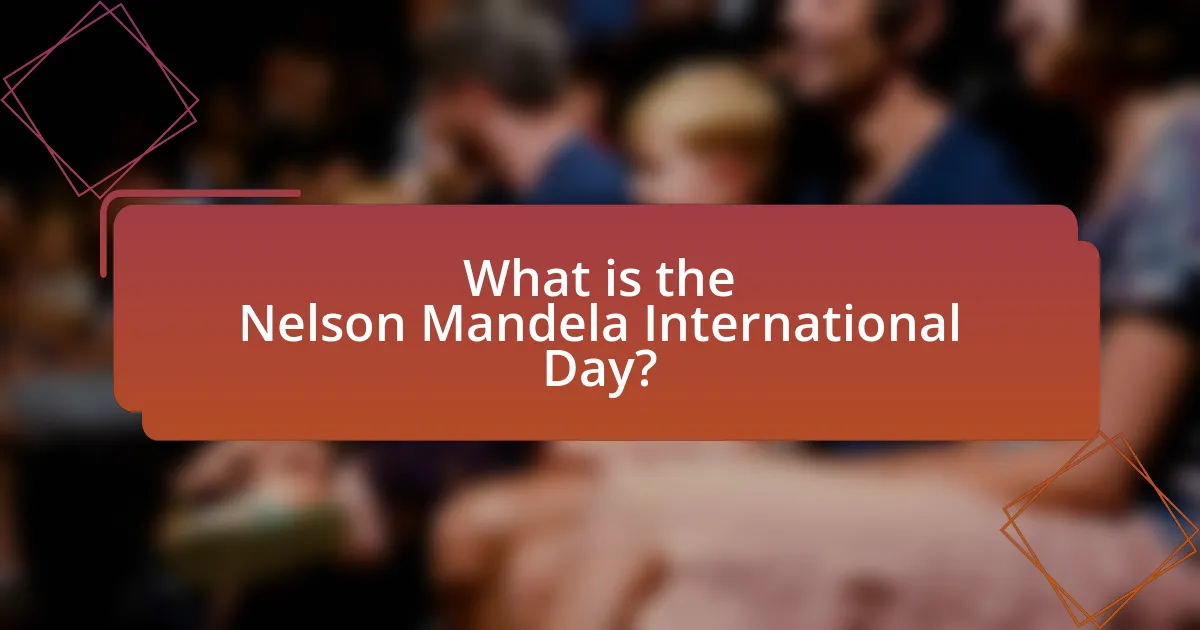
What is the Nelson Mandela International Day?
The Nelson Mandela International Day is a global observance celebrated on July 18 each year to honor the legacy of Nelson Mandela and promote humanitarian efforts. Established by the United Nations in 2009, this day encourages individuals to engage in community service and take action to improve the world, reflecting Mandela’s commitment to social justice and human rights. The observance aims to raise awareness about global human rights issues and inspire collective action, aligning with Mandela’s belief that each person has the power to make a difference.
Why was the Nelson Mandela International Day established?
The Nelson Mandela International Day was established to honor Nelson Mandela’s legacy and promote his values of peace, reconciliation, and social justice. The United Nations officially declared this day on July 18, 2009, recognizing Mandela’s contributions to the fight against apartheid and his commitment to human rights. The observance encourages individuals and organizations to engage in community service and take action to address social injustices, reflecting Mandela’s belief that each person has the power to make a difference.
What historical events led to the creation of this day?
The creation of Nelson Mandela International Day on July 18 was primarily influenced by the global recognition of Nelson Mandela’s contributions to peace, reconciliation, and human rights. This day was established by the United Nations in 2009, marking Mandela’s 91st birthday, to honor his legacy and promote the values he stood for. The UN General Assembly resolution 64/13 emphasized the importance of Mandela’s efforts in fighting apartheid and advocating for social justice, which inspired the international community to dedicate a day to reflect on his ideals and encourage individuals to take action for human rights.
How is the day celebrated globally?
Nelson Mandela International Day is celebrated globally on July 18 each year, honoring Nelson Mandela’s legacy and promoting humanitarian efforts. Various activities take place worldwide, including community service projects, educational events, and discussions focused on social justice and human rights. For instance, in South Africa, people engage in 67 minutes of community service, symbolizing the 67 years Mandela dedicated to fighting for social justice. Additionally, organizations and individuals host events that raise awareness about human rights issues, reflecting Mandela’s commitment to equality and justice. This global observance encourages individuals to take action and contribute to positive change in their communities, reinforcing the importance of human rights advocacy.
What is the significance of Nelson Mandela in human rights advocacy?
Nelson Mandela is significant in human rights advocacy as he symbolized the struggle against apartheid and championed equality and justice. His leadership in the African National Congress and his 27 years of imprisonment highlighted the global fight against racial oppression. Mandela’s presidency from 1994 to 1999 marked the first democratic elections in South Africa, establishing a framework for human rights protections in the new constitution. His efforts earned him the Nobel Peace Prize in 1993, reinforcing his role as a global icon for human rights and inspiring movements worldwide to combat injustice and promote equality.
How did Mandela’s life and actions influence global human rights movements?
Nelson Mandela’s life and actions significantly influenced global human rights movements by exemplifying the struggle against oppression and advocating for equality and justice. His leadership in the anti-apartheid movement in South Africa, which included 27 years of imprisonment, highlighted the importance of resilience and nonviolent resistance in the face of systemic injustice. Mandela’s release in 1990 and subsequent election as South Africa’s first Black president in 1994 served as a powerful symbol of hope and change, inspiring activists worldwide to fight against discrimination and human rights abuses. His establishment of the Nelson Mandela Foundation and the annual Nelson Mandela International Day further promoted global awareness and action for human rights, encouraging individuals to contribute to social justice initiatives.
What are some key achievements of Nelson Mandela in promoting human rights?
Nelson Mandela’s key achievements in promoting human rights include his role in dismantling apartheid in South Africa and advocating for equality and justice. Mandela co-founded the African National Congress Youth League in 1944, which aimed to fight racial discrimination. His leadership in the anti-apartheid movement led to his imprisonment for 27 years, during which he became a global symbol of resistance against oppression. After his release in 1990, Mandela negotiated the end of apartheid and was elected as South Africa’s first Black president in 1994, where he implemented policies promoting reconciliation and human rights. His efforts were recognized globally, earning him the Nobel Peace Prize in 1993, which further solidified his legacy as a champion of human rights.
How does the Nelson Mandela International Day promote human rights awareness?
The Nelson Mandela International Day promotes human rights awareness by encouraging individuals and organizations to engage in community service and advocacy for social justice. This annual observance, established by the United Nations in 2009, emphasizes Mandela’s legacy of fighting for human rights and equality, inspiring global citizens to take action against injustice. Activities such as educational campaigns, volunteer work, and discussions on human rights issues are organized worldwide, fostering a collective consciousness about the importance of human rights. For instance, in 2021, various initiatives highlighted the ongoing struggles against racism and inequality, directly linking Mandela’s teachings to contemporary human rights challenges.
What initiatives are associated with the observance of this day?
The initiatives associated with the observance of Nelson Mandela International Day include community service projects, educational programs, and awareness campaigns focused on human rights and social justice. These initiatives aim to honor Nelson Mandela’s legacy by encouraging individuals and organizations to dedicate 67 minutes of their time to community service, reflecting Mandela’s 67 years of activism. For example, various organizations worldwide engage in activities such as food drives, literacy programs, and environmental clean-ups, which directly contribute to enhancing global human rights awareness and fostering community development.
How do these initiatives impact local communities?
Initiatives related to the Nelson Mandela International Day significantly enhance local communities by fostering a culture of volunteerism and social responsibility. These initiatives encourage community members to engage in service projects that address local needs, such as education, health, and poverty alleviation. For instance, in 2021, over 1.5 million people participated in various service activities globally, demonstrating a collective effort to improve their communities. This engagement not only strengthens community bonds but also raises awareness about human rights issues, aligning with Mandela’s legacy of promoting equality and justice.
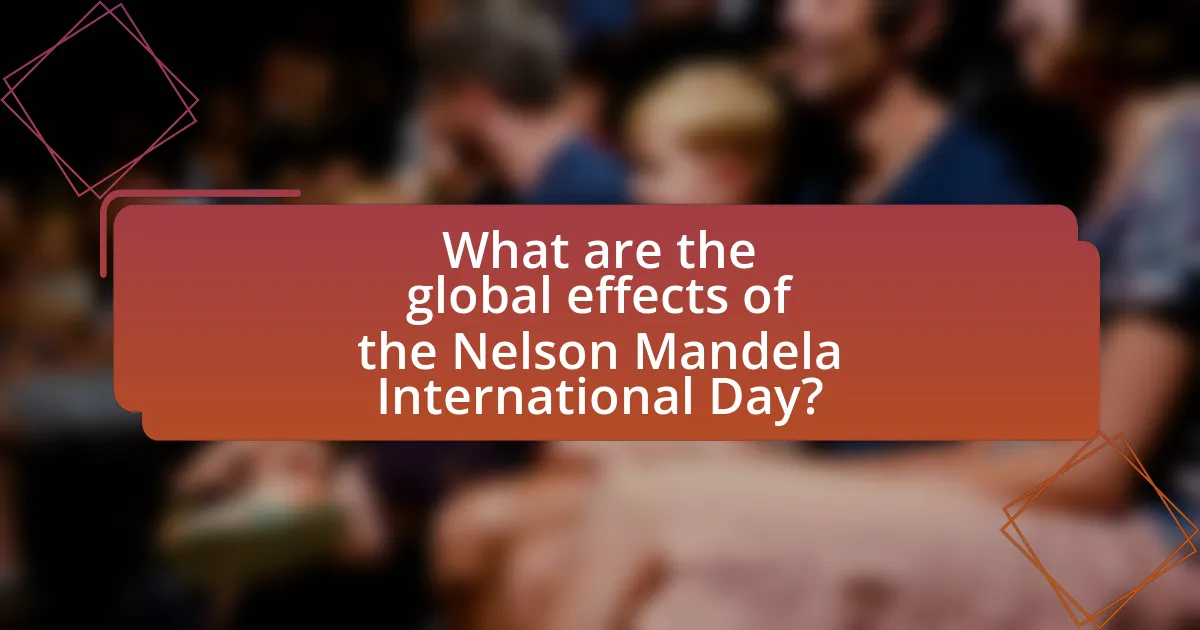
What are the global effects of the Nelson Mandela International Day?
The global effects of the Nelson Mandela International Day include increased awareness of human rights issues and a strengthened commitment to social justice. This annual observance, established by the United Nations in 2010, encourages individuals and organizations worldwide to engage in community service and advocacy, reflecting Mandela’s legacy of fighting for equality and human dignity. For instance, in 2021, over 1.5 million people participated in various initiatives, demonstrating a collective effort to address pressing social challenges such as poverty, inequality, and discrimination. This widespread participation not only honors Mandela’s contributions but also fosters a global culture of volunteerism and activism, ultimately enhancing the dialogue around human rights on an international scale.
How has the day influenced international human rights policies?
The Nelson Mandela International Day has significantly influenced international human rights policies by promoting a global commitment to social justice and human rights advocacy. Established by the United Nations in 2009, this day encourages individuals and organizations to engage in community service and activism, thereby raising awareness about human rights issues. For instance, the day has led to increased support for initiatives such as the Sustainable Development Goals, which aim to eradicate poverty and promote equality, directly aligning with human rights principles. Additionally, various campaigns and events held on this day have resulted in policy discussions at international forums, such as the UN Human Rights Council, where the importance of human rights education and the fight against discrimination are emphasized.
What role do governments play in recognizing this day?
Governments play a crucial role in recognizing Nelson Mandela International Day by officially endorsing the observance and promoting activities that honor Mandela’s legacy. This recognition often includes issuing proclamations, organizing events, and encouraging citizens to engage in community service, reflecting Mandela’s commitment to social justice and human rights. For instance, many countries have established programs that align with the day’s themes, such as education, equality, and community service, thereby fostering a culture of human rights awareness. This governmental support not only elevates the significance of the day but also mobilizes resources and public participation, enhancing the global impact of Mandela’s ideals on human rights.
How do international organizations contribute to the observance of this day?
International organizations contribute to the observance of Nelson Mandela International Day by promoting awareness and encouraging action on human rights issues. For instance, the United Nations, which established this day in 2010, organizes events and campaigns that highlight Mandela’s legacy and the importance of social justice. Additionally, organizations like Amnesty International and Human Rights Watch engage in advocacy and educational initiatives that align with the day’s themes, mobilizing communities to participate in service activities that reflect Mandela’s values of compassion and service to others. These efforts are supported by data showing increased global participation in human rights initiatives on this day, demonstrating the significant impact of international organizations in fostering a culture of awareness and action.
What are the measurable impacts of the day on human rights awareness?
The measurable impacts of Nelson Mandela International Day on human rights awareness include increased global participation in human rights initiatives and heightened public discourse surrounding human rights issues. For instance, the day has seen a significant rise in volunteer activities, with millions of people engaging in community service projects that promote social justice and equality. According to a report by the United Nations, participation in events related to this day has grown by over 30% since its inception in 2010, indicating a broader recognition of human rights challenges. Additionally, social media engagement around the day has surged, with hashtags related to human rights trending globally, reflecting a heightened awareness and dialogue about these critical issues.
How do surveys and studies reflect changes in public awareness?
Surveys and studies reflect changes in public awareness by systematically collecting and analyzing data on people’s perceptions, attitudes, and knowledge regarding specific issues. For instance, research conducted by the Pew Research Center in 2020 indicated a significant increase in global awareness of human rights issues following events like the Nelson Mandela International Day, with 65% of respondents reporting heightened concern for social justice. This data illustrates how targeted initiatives can effectively shift public consciousness, as surveys capture real-time sentiments and trends, providing measurable evidence of evolving awareness.
What success stories have emerged from initiatives linked to this day?
Success stories from initiatives linked to Nelson Mandela International Day include the establishment of numerous community service projects that promote education, health, and social justice. For instance, the “Mandela Day Schools Project” has successfully improved educational facilities in underprivileged areas, benefiting thousands of children by providing better learning environments. Additionally, the “67 Minutes for Mandela” campaign has mobilized individuals and organizations worldwide to dedicate time to community service, resulting in over 1.5 million hours of volunteer work since its inception. These initiatives have significantly raised awareness about human rights issues and inspired global action, demonstrating the day’s impact on fostering a culture of service and advocacy for social justice.
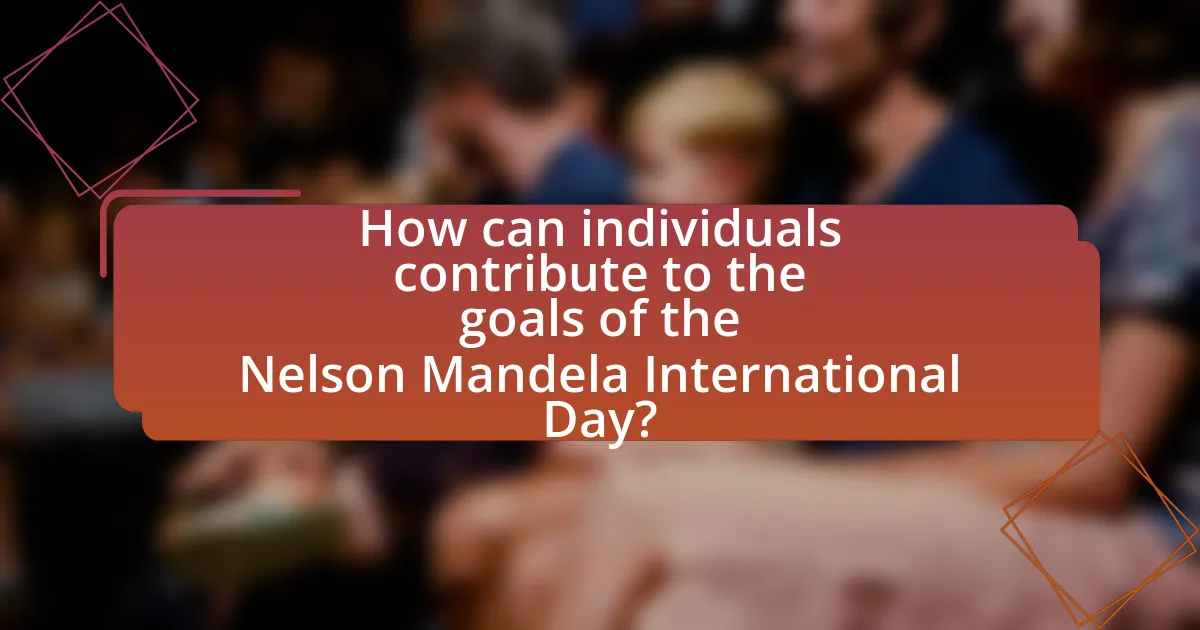
How can individuals contribute to the goals of the Nelson Mandela International Day?
Individuals can contribute to the goals of the Nelson Mandela International Day by engaging in community service and promoting social justice initiatives. This day encourages actions that reflect Mandela’s legacy of fighting for human rights and equality, such as volunteering for local charities, participating in awareness campaigns, or organizing events that address social issues. According to the United Nations, the day is observed on July 18, Mandela’s birthday, and emphasizes the importance of taking action to improve the world, thereby fostering a culture of service and solidarity.
What actions can individuals take to promote human rights on this day?
Individuals can promote human rights on this day by engaging in community service, advocating for social justice, and raising awareness about human rights issues. Community service activities, such as volunteering at local shelters or participating in clean-up drives, directly benefit marginalized groups and foster a spirit of solidarity. Advocacy can take the form of writing to local representatives or participating in peaceful demonstrations to highlight specific human rights violations. Raising awareness can involve sharing educational resources on social media or organizing discussions to inform others about the importance of human rights, as evidenced by the global observance of Nelson Mandela International Day, which emphasizes the need for collective action to address injustices.
How can volunteering efforts make a difference?
Volunteering efforts can make a significant difference by directly addressing social issues and improving community well-being. For instance, studies show that volunteer work can enhance educational outcomes, as evidenced by programs where volunteers tutor underprivileged students, leading to improved academic performance. Additionally, volunteering fosters social cohesion and community resilience, as seen in initiatives that mobilize volunteers during crises, such as natural disasters, where their efforts provide essential support and resources. Furthermore, research indicates that volunteering can increase awareness of human rights issues, as participants often engage with marginalized communities, thereby promoting empathy and advocacy for social justice.
What resources are available for individuals to get involved?
Individuals can get involved in the Nelson Mandela International Day through various resources such as official websites, local community organizations, and social media platforms. The United Nations provides a dedicated website that outlines ways to participate, including volunteering, advocacy, and educational initiatives. Additionally, organizations like Amnesty International and Human Rights Watch offer resources and campaigns that individuals can join to promote human rights awareness. These platforms often provide toolkits, event listings, and social media campaigns to facilitate engagement.
What best practices can be adopted for effective participation?
Effective participation can be achieved by fostering inclusivity, ensuring clear communication, and providing adequate resources. Inclusivity encourages diverse voices, which enhances the richness of discussions and decision-making processes. Clear communication, including setting expectations and providing feedback, helps participants understand their roles and contributions. Adequate resources, such as training and access to information, empower individuals to engage meaningfully. Research indicates that organizations that implement these practices see increased engagement and satisfaction among participants, leading to more effective outcomes in initiatives like the Nelson Mandela International Day, which aims to raise awareness of global human rights issues.
How can social media be leveraged to raise awareness?
Social media can be leveraged to raise awareness by facilitating the rapid dissemination of information and engaging diverse audiences. Platforms like Twitter, Facebook, and Instagram allow organizations and individuals to share impactful stories, statistics, and calls to action related to human rights issues. For instance, during the Nelson Mandela International Day, campaigns utilizing hashtags can mobilize global participation, as seen in the #MandelaDay initiative, which encourages people to contribute 67 minutes of their time to community service, thereby amplifying the message of social justice and human rights. This approach not only increases visibility but also fosters community engagement and collective action, evidenced by the millions of posts and interactions generated during such campaigns.
What are some successful examples of grassroots movements related to this day?
Successful examples of grassroots movements related to Nelson Mandela International Day include the 67 Minutes Campaign and the #ActionAgainstPoverty initiative. The 67 Minutes Campaign encourages individuals to dedicate 67 minutes of their time to community service, reflecting Mandela’s 67 years of activism. This initiative has mobilized millions globally, fostering community engagement and social responsibility. The #ActionAgainstPoverty initiative, launched by the United Nations, aims to raise awareness and action against poverty, aligning with Mandela’s vision for social justice. Both movements have successfully inspired collective action and heightened awareness of human rights issues, demonstrating the enduring impact of Mandela’s legacy on global activism.
